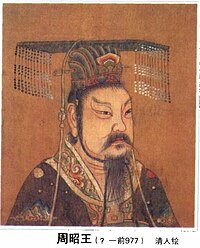King Zhao of Zhou
| King Zhao of Zhou 周昭王 |
|||||
|---|---|---|---|---|---|

King Zhao
|
|||||
| King of China | |||||
| Reign | 977/75-957 BC | ||||
| Predecessor | King Kang of Zhou | ||||
| Successor | King Mu of Zhou | ||||
| Died | 957 BC | ||||
| Spouse | Lady Yin of the Ji clan | ||||
| Issue | King Mu of Zhou | ||||
|
|||||
| House | Zhou dynasty | ||||
| Father | King Kang of Zhou | ||||
| Full name | |
|---|---|
|
Ancestral name: Jī (姬) Given name: Xiá (瑕) |
King Zhao of Zhou (Chinese: 周昭王; pinyin: Zhōu Zhāo Wáng), personal name Jī Xiá, was the fourth king of the Chinese Zhou dynasty. He ruled from 977/75 BC until his death twenty years later. Famous for his disastrous war against the Chu confederation, his death in battle ended the Western Zhou’s early expansion and marked the beginning of his dynasty’s decline.
By the time of King Zhao's coronation, his father King Kang and grandfather King Cheng had conquered and colonized the Central Plains of China, forcing most of the northern and eastern tribal peoples into vassalage. Only the Dongyi of eastern Shandong continued their resistance, but they were no longer a threat to Zhou rule. As result, King Zhao inherited a prospering kingdom, and could afford to build a new ancestral temple for his father. This temple, known as “Kang gong”, was built in line with ritual reforms of the time and would grow into “one of the two central temples of dynastic worship”, the other being the much older “jinggong” temple.
With the north and east pacified and a large military force under his control, King Zhao turned his attention to the Yangtze basin. This region of great mineral wealth was under the control of the confederation of Chu, with whom the Zhou kingdom had been on good terms for almost two centuries. Under King Zhao the relationship between the two polities deteriorated, however, as Chu continued its aggressive expansion and Zhou demand for gold, copper and tin grew. As hostilities grew, broder clashes ensued that eventually escalated into open war. No longer tolerating Chu’s perceived defiance, King Zhao invaded the Chu confederation in 961 BC. He initially conquered the region to the north of the Yangtze, and then defeated and subdued the 26 states of the Han River valley, including Chu. Probably unable to permanently occupy the latter region, the king eventually retreated with much loot.
...
Wikipedia
